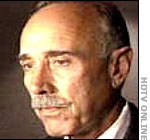|
It started as an anonymous tip within a few days after Kay Sybers's death. According to court records, authorities from the Florida Department of Law Enforcement received a call from a man who claimed that Sybers had taken some odd and suspicious steps in the hours and days after Kay Sybers' death. In fact, according to court papers, the caller was unambiguous in his allegation. He flatly told authorities that "William Sybers had murdered his wife."
Taken by itself, the call might have been dismissed, chalked up, perhaps to the ranting of a disgruntled employee or someone with a grudge against Sybers or the medical examiner's office. Sybers was, after all, a public official - Bay County's answer to "Quincy" is how one family member described him in a January 2002 television interview broadcast first by NBC's "Dateline" in conjunction with Court TV. In his years in the job, Sybers was certain to have ruffled some feathers.
All the same, investigators decided to take a closer look at the case.
Almost immediately, the investigators became suspicious, said Harry Shorstein, the state attorney who joined the case in 1992 and has been, by his own account, consumed by it ever since.
 | | Harry Shorstein |
It wasn't just Sybers' bedside behavior on the morning of the death that troubled the authorities, though the seemingly cavalier way that Sybers seemed to have handled his wife's obvious illness was a factor, Shorstein said. What piqued authorities' interest was the fact that Sybers who, as medical examiner was charged with reviewing virtually all unattended deaths in the Bay County area, and who in all likelihood would have ordered an autopsy had the deceased been anyone else, had his dead wife's body taken almost immediately to a funeral home and at first refused to permit an autopsy.
According to Sybers' defenders, there was a simple explanation for that decision. As witnesses would later testify and a court would later conclude, although "it is the practice in Florida, following an unattended death, for the body to be transported to the closest medical examiner for autopsy," in this case, the duty would have fallen on Bill Sybers. "When (Sybers) arrived on the scene, however, he was visibly distraught." Thus, the court concluded, "no one questioned his decision to have the body transported directly to a funeral home."
But there were questions raised about Sybers' decision to refuse to permit his wife to be autopsied.
|



